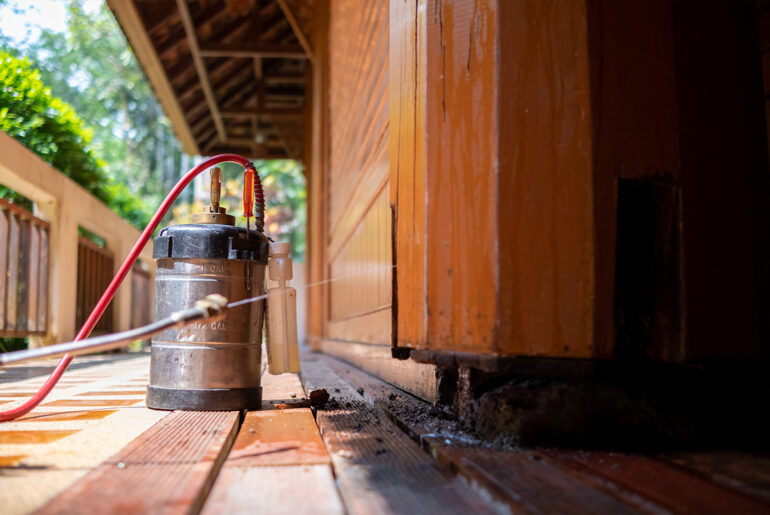Pest control professionals face a unique blend of challenges and rewards that come with managing and eliminating pests. The field also presents diverse job opportunities, ranging from owner-operators and office staff to hands-on technicians and experts in pest management strategies. Here, we’ll focus on the ins and outs of working as a pest control technician — a role that’s currently in particularly high demand, ensuring a stable job market for those pursuing this career.
What does a pest control technician do?
A pest control technician’s daily responsibilities can vary dramatically, just like the needs of pest control customers. In addition to customer demands, this can be impacted by season and geographic area, as these affect what types of bugs and pests are present.
The day typically begins by reviewing the day’s schedule and client appointments. Ideally, the pest control company will use scheduling and routing software to help technicians spend less time navigating between appointments. This often includes a mobile app, allowing techs to access their schedule and routes right on their device.
Technicians often receive service requests for a variety of pests, including insects like termites, ants, and bedbugs, as well as rodents such as mice and rats. After reviewing the schedule, technicians ensure their vehicles are equipped with the necessary equipment and pesticides tailored to the specific pest problem.
Fieldwork constitutes a significant portion of a pest control technician’s day. On-site inspections involve a thorough assessment of the pest issue, allowing techs to evaluate the extent of the problem and determine the best way to approach it. Technicians must be knowledgeable about the habits and biology of different pests to ensure effective, efficient solutions. Inspections may involve accessing attics, crawlspaces, basements, and other confined areas to locate and identify pests and their habitats. Additionally, technicians need to be familiar with customer service histories and past recommendations to ensure ongoing treatment is consistent with customer expectations.
Once the assessment is complete, technicians carry out the chosen pest control methods. This could involve applying pesticides, setting traps, or employing more eco-friendly alternatives, depending on the situation and the processes the individual company prefers. Technicians must also communicate effectively with clients, providing information on the treatment process, preventive measures, and any necessary follow-up actions. Typically, they’ll share a record of what’s been performed during the service visit as proof of completion.
Documentation is a crucial aspect of a pest control technician’s daily routine. Accurate records detailing the type and extent of infestations, the treatments applied and any recommendations for future prevention help both the technician and the client track the effectiveness of the pest control measures over time. Depending on the pest and service rendered, this may also involve filling out specific forms to ensure the business remains compliant with state or local authorities.
Beyond the physical aspects of the job, pest control technicians often engage in ongoing education — such as Continued Education Units (CEUs) required for ongoing licensure — to stay abreast of new technologies, regulations, and environmentally friendly practices. This ensures that they can offer the most effective and responsible solutions to clients while adhering to industry standards and safety protocols. Typically, training and education are overseen by the employing company to ensure technicians are all on the same page with best practices.
How does one become a pest control technician?
Becoming a pest control worker involves a combination of education, training, and on-the-job experience. Most employers look for candidates with a high school diploma or equivalent, as this is the basic educational requirement for entry-level positions in the field. While a college degree is not always mandatory, coursework in biology, entomology, or a related field can provide a solid foundation for understanding the science behind pest control.
The next crucial step is to gain practical experience and training. Many pest control workers start as apprentices or assistants under the guidance of experienced professionals. This hands-on experience is invaluable, as it allows individuals to learn about common pests, effective control methods, and the safe use of pesticides. Aspiring pest control workers should seek opportunities to work with established pest control companies, government agencies, or pest management associations that offer training programs or on-the-job training for new employees.
Get Started With Pest Control Software!
Formal certification and licensure may be required, depending on the region and what materials are being used. Pest control workers often need to pass exams that demonstrate their knowledge of pest biology, control methods, and the safe use of chemicals. Many pest control companies employ technicians with varying licenses or specialties, using specialty software to ensure that jobs are assigned to techs with the correct skill sets.
In addition to technical skills, strong communication and customer service skills are crucial for success in this field. Pest control workers often interact with clients, explaining treatment plans, offering prevention advice, and addressing concerns. Developing a good rapport with clients can contribute to customer satisfaction and repeat business, which are prized by employers.
Networking within the pest control industry is beneficial for career advancement. Joining professional organizations, attending conferences, and staying connected with industry updates can open doors to new opportunities and help individuals stay informed about best practices in pest control.
What are the pros of being a pest control technician?
Working as a pest control technician offers a range of advantages. One of the primary benefits is the sense of job satisfaction derived from actively contributing to public health and safety — there are not many industries that can match pest control when it comes to customers being happy to see you! Pest control technicians play a crucial role in protecting homes, businesses, and communities from the health risks and property damage associated with pests. This sense of purpose can be particularly rewarding, as technicians witness tangible results from their efforts in creating healthier and pest-free environments.
Another advantage is the diversity within the profession. Pest control technicians engage with a variety of tasks and environments daily, keeping the job dynamic and interesting; each day tends to be unique and different. From inspecting properties to identifying pests, implementing targeted treatments, and educating clients on preventive measures, the role demands a mix of skills and presents constant opportunities for learning and problem-solving. This variety can be especially appealing to individuals who prefer a hands-on, active work style rather than a straightforward routine.
Additionally, the demand for pest control services ensures a stable job market; consider that even during the COVID-19 pandemic, pest control was deemed an essential business. As long as pests continue to pose threats to public health and property —as they have for as long as humans have been living indoors — there will be a need for skilled technicians to address these issues. Overall, the combination of job satisfaction, diversity in tasks, and a stable job market makes working as a pest control technician an attractive and fulfilling career option.
What are the cons of working in pest control?
Like any vocation, a career as a pest control technician has unique challenges in addition to its benefits. One of the notable drawbacks is the exposure to potentially harmful chemicals and pesticides, which are often a crucial component of pest control treatments. As some materials can pose health risks to technicians who handle them regularly, strict safety protocols are essential. When considering a job as a pest control tech, be sure to discuss safety procedures with potential employers to take precautions and adhere to safety guidelines diligently on the job.
The physical demands of the job are another potential con to consider. Pest control technicians often find themselves in uncomfortable and sometimes hazardous environments, such as crawling into tight spaces, navigating attics or basements, or dealing with infestations in challenging conditions are routine aspects of the job. This can lead to physical strain and discomfort, making the profession less suitable for individuals who may have physical limitations or prefer a less physically demanding role.
Lastly, the job can be emotionally taxing. Pest control technicians often deal with distressed clients facing pest-related issues, and they may encounter severe infestations that can be emotionally challenging. Additionally, the necessity of dealing with deceased pests, such as rodents or insects, can be unpleasant for some individuals. Balancing these aspects of the job is crucial for maintaining a good outlook and work-life balance for any pest technician.
The role of a pest control technician is a multifaceted one, marked by both advantages and challenges. Ultimately, individuals considering a career in pest control must carefully weigh the pros and cons. For those passionate about problem-solving, helping communities, and working in a dynamic environment, the rewards can be substantial.




